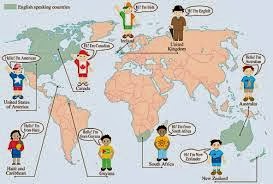SOCIAL NORMS AND MANNERS
Social norms and manners change from country to another. If you are planning to travel abroad or you just feel curious about other places´customs, click on the link and start reading.
Now, watch the video.
Sophia: So how polite do you think you guys are on a scale from 1 to 10?
Joyce: It depends with whom.
Vicky: Or the mood.
Sophia: Oh, go on.
Vicky: Generally, I think I’m quite polite. I think British people often tend to be quite polite at least with their pleases, thank yous, would you mind.
Sophia: May I?
Louise: And profuse apologies. I find it's the same in Australia. We have those, and also we say 'sorry' for everything. We say the buses go past with 'Sorry Not in Service'. We’re always apologizing, whereas other countries it's not quite the same I think.
Sophia: Yeah, I think we’re very big on etiquette and sorry. If you bump into somebody, you say 'sorry' whether it s your fault or not, yeah, it s just the etiquette and when you meet somebody, you give them a firm handshake. That’s also very important. A weak handshake, you’re not such a good person. Strong handshakes mean that you’re confident, you actually want to meet the person that you’re meeting at the time, yeah.
Vicky: And hand crushing handshakes mean, 'don’t mess with me'.
All: Ha, ha, ha.
Joyce: Yeah, but then you got all the complication of the kissing like in different countries, you know, and then if it’s two, if it s one, if it s three, if it s four.
Vicky: In both directions.
Joyce: In France, in certain areas of France it’s three and in other areas of France it’s four.
Louise: And in some places it’s two.
Vicky: In Holland it’s three.
Sophia: I’ve made the mistake of thinking, 'oh it’s one', and they’ve gone for the second one and hmm, uncomfortable situation.
Vicky: I’ve made the mistake of going in the wrong direction, ha, ha, ha.
Sophia: Kissing them on the lips. Ha, ha, ha.
Louise: Have you ever almost made contact on the lips? I did that once.
Vicky: Oh, yeah?
Louise: It was so embarrassing.
Vicky: It s embarrassing.
Louise: But I think, I think, the world’s so global now everybody has a, they’re very tolerant to each other
I don t think anyone’s, anyone’s judging others for not following exactly the manners from their culture I think.
Joyce: Yeah, but for example, we’re not used to bowing and of course like in Asian cultures they do that, you wouldn’t shake somebody's hand and you certainly wouldn’t kiss them, you know also. You really have to be careful sometimes if you go to another country to find out about these little things.
Louise: Definitely, but also I think people are very understanding these days.
Vicky: Well, like in Asia, for example, a gesture that you would do, like to touch someone on the head with our culture, it’s an affection, it’s something you do to someone if you know them well.
Joyce: Or especially the children.
Vicky: It can be patronising obviously, the way some people do it, it can be patronising, the way people do it, but generally it’s not something you would do to someone you didn’t know, it’s certainly not a disrespectful thing, whereas in Thailand if you do it, it’s they don't understand, they don't understand why you would possibly do that.
Sophia: And in certain cultures, erm, you should burp after eating to show that you really enjoyed your meal, but,you know, if you do that in UK, you must say 'I beg your pardon' please, but in certain cultures you should (burp) thanks for that, that was great.
Louise: I enjoyed it very much.
All: Ha, ha, ha.
Louise: Well, I think there are some things that are standard. I mean pleases and thank yous, they go well everywhere, no matter where you go.
Sophia: Yes.
Reblogged from My That's English!



Comentarios